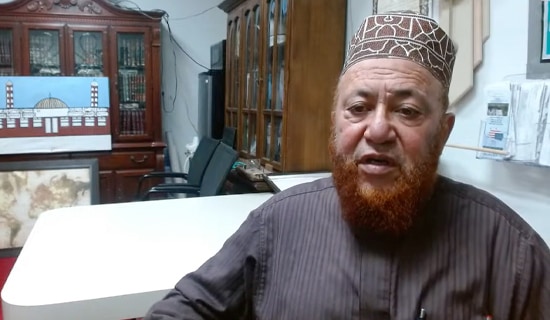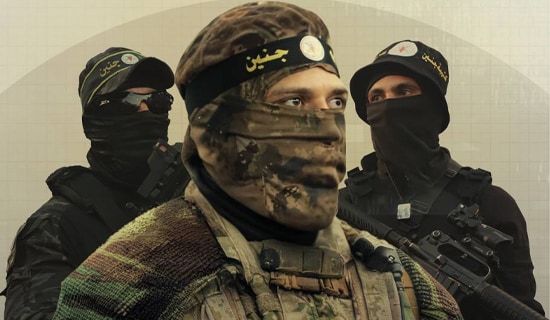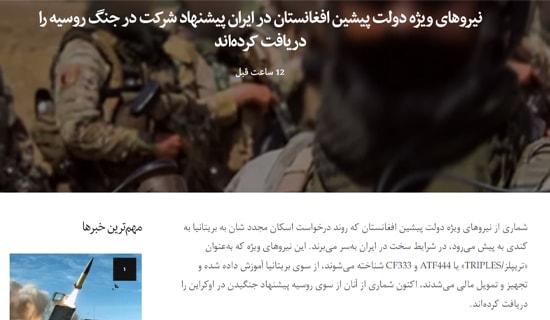Introduction
On April 10, 2020, Tehran welcomed the designation of Mustafa Al-Kadhimi, Iraq's pro-U.S. Chief of Intelligence as its new Prime Minister, a decision reached with consensus among Iraq's political groups. Abbas Mousavi, spokesman of Iran's Foreign Ministry, said in a statement that Al-Kadhimi's designation is "the right step in the right direction," wishing him success in his mission to meet the demands of the Iraqi people.[1]
Iraj Masjedi, the Iranian ambassador to Baghdad, similarly stated that "Iran supports the appointment of Mustafa al-Kadhimi as the new Prime Minister of Iraq" and that the country "views him positively."[2] Commenting on the news, Iran's state-run news agency, Tasnim, anticipated that Al-Kadhimi will succeed in forming a cabinet within the mandated 30 days.[3]
Iran's welcoming of Al-Kadhimi's designation came as a surprise. Just a few weeks before he was appointed, Iran-backed political groups accused Al-Kadhimi of providing the U.S. with the intelligence that facilitated the January 3, 2020 airstrike that killed the Islamic Revolutionary Guard Corp's (IRGC) Qods Force commander Qassim Soleimani and the Popular Mobilization Units (PMU) deputy commander Abu Mahdi Al-Muhandis.[4]

The new Iraqi designated PM Mustafa Al-Kadhimi (Source: Twitter.com/malimusawi)
If he succeeds in forming a cabinet, Al-Kadhimi might very well thwart Iran's ultimate goal of ousting U.S. troops from Iraq, a possibility which Tehran and its proxies in Iraq have been pointing to repeatedly and loudly since the death of Soleimani.
An Iraqi government headed by Al-Kadhimi and supported by the U.S. could also threaten Iran's economy, which relies on Iraq as a last-ditch lifeline. It would also threaten their land supply route to Syria.
In light of this, the positive reaction expressed by Iranian officials and media raises some serious questions as to what might have prompted Tehran's change of tune, and whether its acceptance of a pro-U.S. Iraqi Prime Minister signals an overall shift in its policy in Iraq and the rest of the region.
What Prompted Iran To Accept Al-Kadhimi?
To answer this question, one must look back at the recent events leading up to Iran's acceptance of Al-Kadhimi.
First, Iran's extensive meddling in the internal affairs of Baghdad has elicited a growing political and public opposition, as evidenced by the anti-government protests which lasted for months, and which resulted in the resignation of one of Iran's closest allies in Iraq — PM Adel Abdul Mahdi, who was in power for less than a year. Mahdi is widely accused of making backroom deals that served Iran's strategic interests and economy and expanded the influence of PMU factions in the Iraqi state.[5]
Second, amid the anti-government protests, said to have been oppressed by Iran-backed groups, came the U.S airstrike which eliminated Soleimani and Al-Muhandis. Iran has been unable to find the right replacements for the two men, and thus failed to ensure its tight grip over the Shi'ite parties and militias in Iraq.
The new IRGC Quds Force commander, Ismael Qanni, has so far demonstrated that he is unable to fill the shoes of his predecessor. His recent visit to Baghdad on April 2 to unify the Shi'ite groups in rejecting a pro-U.S. candidate for the post of Prime Minister has proven to be a failure.[6]
Third, the killing of Soleimani and Al-Muhandis served as the beginning of the fragmentation within the PMU scene. The most obvious symptom of this fragmentation was the withdrawal of Grand Ayatollah Ali Al-Sistani's aligned factions from the PMU and their subsequent plan to merge with the Iraqi security forces.[7]
Fourth, the withdrawal of Al-Sistani's well-equipped and trained factions from the PMU also signaled the termination of Al-Sistani's 2014 fatwa, which obligated all capable Iraqi men to take arms against ISIS. Iran took advantage of that fatwa to help establish the PMU as existing outside the authority of the Iraqi state in the fight against ISIS. The termination of the fatwa strips the PMU of the cover of religious legitimacy, which they have been misusing to target U.S. interests in Iraq, thus making them vulnerable to being held legally accountable.
Fifth, the efforts of PMU factions to outdo each other in expressing their loyalty to Tehran resulted in growing rifts between them on the question of who will succeed Al-Muhandis, in addition to further damaging Iran's ability to agree on how to address the presence of the U.S. in the country.
Sixth, the PMU factions had begun exhibiting signs of their fear of U.S. retaliation, so much so that they began denying their involvement in recent rocket attacks targeting the U.S. embassy or Iraqi military bases that house U.S. troops.
The factions obviously fear facing the same fate as Soleimani and Al-Muhandis. This has limited Iran's options for targeting U.S. troops.[8] In fact, some of Iran's proxies went even further, and denounced rocket attacks targeting U.S. troops and interests. For example, the pro-Iran Fatah coalition condemned the three rockets which landed near the site of U.S. Halliburton oil service, saying such attacks "cause severe damage to the Iraqi economy."[9]
Seventh, Tehran has also realized that any attack against U.S. troops in Iraq will prompt a severe military retaliation from Washington, one which will target not only Iran's proxies in Iraq, but Iran itself. Iranian officials fully understood President Donald Trump's message when he tweeted on April 1 that Iran and its proxies will pay a heavy price if U.S. troops or assets in Iraq were to be attacked.[10]
Eighth, Iran's unsuccessful alternative tactic of creating fictitious Iraqi armed groups such as the League of Revolutionaries or People of the Cave, and blaming them for rocket attacks against U.S. troops has proven to have little — if any — impact on the presence of U.S. forces in the region. Accusing these groups also demonstrates Iran's wish to disassociate itself from the more recent attacks.[11]
In this regard, three previously unknown Shi'ite militia groups have surfaced in April: Usbat Al-Thaereen [League of Revolutionaries], Asehab Al-Kahf [People of The Cave] and Qabdat Al-Huda [The Fist Of Guidance]. The three groups have issued threats against the U.S. presence in Iraq, including videos showing drone footage of the U.S. Embassy in Baghdad's Green Zone[12] and the Ain al-Assad military base which houses U.S. troops in Anbar.[13]
Lastly, in addition to all these crippling factors, the COVID-19 crisis has brought a sharp drop in oil prices, further aggravating Iran's economic difficulties and inhibiting Iran's ability to advance its goals in Iraq.
Does Endorsing Al-Kadhimi Signal A Change In Iran's Policy In Iraq And The Rest Of The Region?
Russia, the United States, Turkey, and Israel have all taken action to limit Iran's ability to control Syria and Iraq as part of its scope of influence. And yet, Iran has proved before that it knows how to turn threats against it into opportunities for ensuring the survival of the regime as safeguarding its regional influence.
Recognizing its weaknesses and recent failure in Iraq, Iran's endorsement of Al-Kadhimi comes as part of a new, pragmatic approach, which is nevertheless limited to Iraq, and not the rest of the region.
Even so, while Iran seemingly accepted Al-Kadhimi's designation in Iraq, it will continue to obstruct his task of forming a government. In its efforts to do so, Iran will use stalling tactics, and threaten that if the new PM fails to oust U.S. troops from Iraq through diplomatic channels, Iran's proxies will resort to force once again.[14]
One should also expect Iran to take covert action in its efforts to rid itself of its major opponents, who may continue to threaten the Iranian hegemony in Iraq: President Barham Saleh and his protégée, the designated-PM Mustafa Al-Kadhimi.
S. Ali is a Research Fellow at MEMRI.
[1] Tasnimnews.com, April 9, 2020.
[2] iraqakhbar.com, April 11, 2020.
[3] tasnimnews.com, April 12, 2020.
[4] See MEMRI Dispatch No. 8602, Battle For Iraq's Premiership: Iran-Backed Shi'ite Factions Seek To Marginalize Al-Sistani, Obstruct Appointment of Pro-U.S. Intelligence Chief Al-Kadhemi As PM, And Try To Reinstate Pro-Iran Abdul Mahdi, March 3, 2020.
[5] See MEMRI Dispatch No. 8483, After His Call To End U.S. Military Presence In Iraq, Adel Abdul-Mahdi Seeks To Be Reinstated As Iraq's Prime Minister With The Support Of Pro-Iran Lawmakers, Jan 29, 2020.
[6] See MEMRI Dispatch No.8491, Commanders Of Shi'ite Militias In Iraq Continue To Threaten U.S. Forces While Seeking To Mend Internal Rifts, January 13, 2020.
[7] See MEMRI Disparch No.8648, Anti-Iran Political Forces In Iraq Move To Free Iraq From Decade-Long Submission To Iranian Hegemony, March 19, 2020.
[8] See MEMRI Dispatch No. 8526, Pro-Iran And Iran-Backed Elements In Iraq Deny Any Responsibility For Attacks On U.S. Targets, January 27, 2020.
[9] Almayadeen.net, April 6, 2020.
[10] Twitter.com/realDonaldTrump, April 1, 2020.
[11] See MEMRI Dispatch No. 8640, New Iranian Tactic: Unknown Group Issues Statement Of Responsibility For Attacks On U.S. Forces In Iraq, April 16, 2020.
[12] See MEMRI JTTM report, Iraqi Group Threatens U.S. Embassy In Baghdad: 'Our Eyes Are Monitoring Your Movements', April 3, 2020
[13] See MEMRI JTTM report, League Of Revolutionaries Releases Video Threatening To Target Iraqi Military Base Housing U.S. Troops, April 9, 2020.





